Exploring Lucky Charms in Gambling: Beliefs and Impact
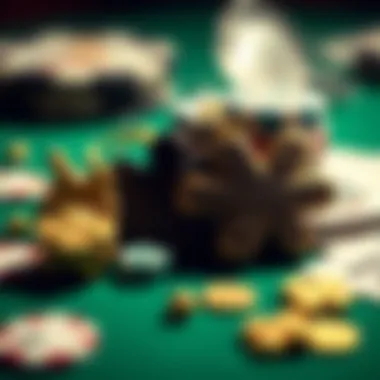
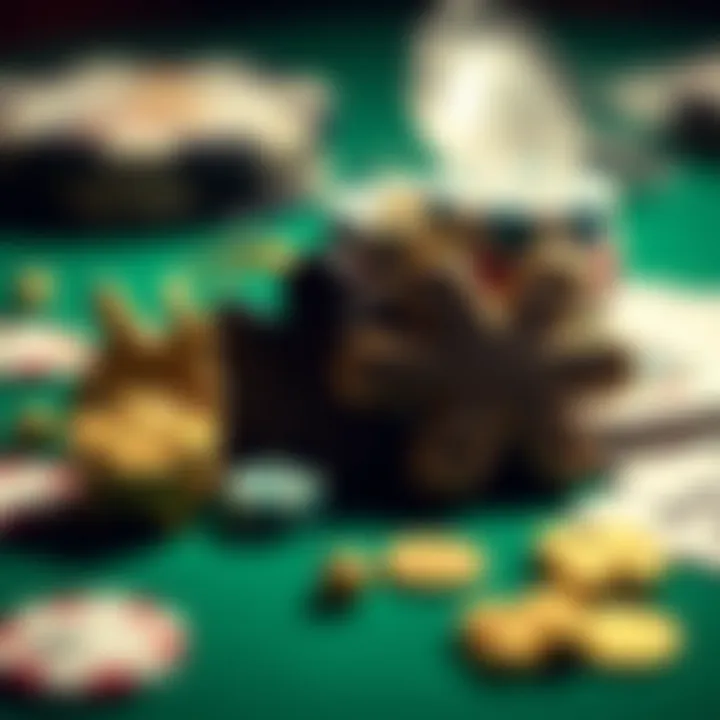
Intro
Gambling, for many, is more than just a game of chance; it’s steeped in rituals and beliefs. The idea of lucky charms is one that stretches across cultures and centuries. From worn-out rabbit's feet to intricately crafted talismans, the perception that certain objects can influence luck is a common thread among gamblers. This exploration dives into the historical roots of lucky charms, their significance in different cultures, and the psychological factors that drive players to cling to them.
As we dissect the world of gambling strategies, it becomes essential to understand how these charms play into a player’s mindset. Simply put, a winning hand may not just rely on cards, but on the belief that a particular charm will steer fortune in their favor.
Thus, whether it's clutching a jade pendant during a game of poker, or tossing a special coin before placing bets, these actions are not trivial; they shape the player’s approach and overall experience in the game.
In this context, we will delve into the intersection of belief and strategy, investigating how lucky charms influence decision-making at the tables and shifting the narrative from mere superstition to a fascinating interplay of psychology and gambling strategies.
Understanding Lucky Charms
Gambling has woven a rich tapestry of beliefs, habits, and superstitions, with lucky charms occupying a significant space. These objects hold a deep-rooted importance not merely as trinkets, but as symbols that help shape the mentality of players. Recognizing the significance of lucky charms allows one to understand how they influence behaviors and outcomes in gambling scenarios. Whether in a bustling casino or a friendly poker night, the presence of a lucky charm could serve as a confidence booster or instill a sense of security.
In this exploration, we'll dive into the specific elements that underline the essential nature of lucky charms in gambling contexts. By dissecting their origins and cultural significance, we gain insights into their enduring appeal. Moreover, we will reflect on how these beliefs can both benefit players as they navigate their strategies, as well as the dangers of overreliance on these symbols for success.
Definition and Origins
The term "lucky charm" typically refers to any item that someone believes can bring them good fortune. This could range from anything as commonplace as a special coin to more elaborate artifacts like a talisman crafted for luck. The origins of lucky charms are as varied as the cultures that cherish them. For instance, in many cultures, such as Irish traditions, four-leaf clovers are seen as potent good luck symbols, while in Asian cultures, jade stones are revered for their protective properties. Throughout history, these items have transcended mere objects, evolving into representations of hope and belief in a better outcome.
What’s intriguing is how these charms originate from ancient practices—many were initially utilized in religious or spiritual contexts. The belief was that these objects carried a certain power, conferring protection or prosperity upon the holder. As these traditions traveled across borders, they adapted and morphed into different forms reflecting local beliefs and practices.
Cultural Influence on Beliefs
The cultural landscape is steeped in various beliefs around lucky charms, reflecting the values and traditions of different societies. For example, in many Hispanic cultures, the evil eye is a pervasive fear. Amulets designed to counteract this negativity, like the nazar, are widely used. These symbols serve to create a mental fortification against misfortune.
In contrast, balancing risk with supposed fortune forms part of the narrative in Western cultures, where ideas of luck play into the entertainment aspects of gambling. The manifestation of such beliefs in games ranges from players carrying good luck tokens to sitting in specific seats during game play, influenced by tales of past successes.
Even in a globalized world, these beliefs show resilience, forming a fascinating amalgamation of rituals that bring people together while enhancing their gaming experiences. These cultural lenses offer layers of understanding about why individuals from different backgrounds cope with luck and chance in divergent ways.
"Beliefs shape our behaviors, and lucky charms are a reflection of that mental framework—providing both comfort and a touch of irrationality in the high-stakes environment of gambling."
Understanding the layers of cultural influence helps build a nuanced comprehension of how gamblers, both seasoned and novices, approach their gameplay. It melds their personal narratives with the global history of luck, illustrating the powerful interplay between belief, action, and outcome.
Types of Lucky Charms
In this realm where chance dances with fortune, the manner in which individuals seek luck through various charms becomes pivotal in gambling practices. Understanding the types of lucky charms is essential not merely as a catalog of beliefs but as a window into human psychology and behavior when faced with uncertainty. Whether small tokens or grand rituals, these charms serve as symbols of hope, comfort, and a hint of control over otherwise unpredictable outcomes. They shape interactions at casinos, poker tables, and other gambling venues, enveloping players in a tapestry woven with both tradition and individual significance.
Commonly Believed Charms
Four-Leaf Clovers
Identified by its striking rarity, a four-leaf clover elicits a sense of wonder, and for many gamblers, it embodies hope. This genome is a rare mutation of the typical three-leaf variety, where each leaf signifies something special: faith, hope, love, and luck. This charm, being somewhat of a needle in a haystack, enhances its appeal among collectors and superstitious folks alike. What makes it a desirable choice is its association with positive fortunes — many people truly believe that possessing one will bring good luck in their endeavors, making it a popular addition to player rituals.
However, some may argue about its efficacy in the high-stakes atmosphere of gambling. The primary advantage lies in the psychological comfort it offers rather than any tangible impact on outcomes. Players are more inclined to relax and focus when clutching this token, which could, in a way, indirectly improve performance at the tables.
Horseshoes
Often hung above doorways, the horseshoe has vast folklore surrounding it. Traditionally, it is thought to ward off evil spirits, and in gambling, it transforms into a beacon of good luck. The shape itself, open at the ends, is believed to capture the luck and ensure it flows towards the owner. Its hardiness and historical associations with strength and protection tightly weave it into the fabric of luck in games.
The horseshoe's unique advantage lies in its versatility; it can be used as a pendant, a keychain, or even adornments in gaming environments. The mere sight of a horseshoe often brings a sense of reassurance. Still, players must navigate the fine line between faith in the horseshoe and the reality of probabilities in gaming strategies. When luck alone is relied upon, the risks may escalate.
Rabbit’s Foot
The rabbit's foot is another popular charm celebrated across cultures as a symbol of good fortune. Originating from ancient beliefs, it is essential to note that not all would leap to embrace it with open arms due to ethical concerns surrounding the use of animal parts in superstitions. For those who do cherish it, the rabbit's foot is usually kept as a talisman, believed to bestow increased luck and favorable results.


What makes the rabbit’s foot particularly noteworthy is its global recognition. Many cultures view it as a protective item that wards off misfortune. The charm’s unique feature lies in the story attached to it — it’s not simply an object; it embodies the hope of overcoming odds. However, like the other charms, it all comes down to belief. If a player finds confidence in its magic, it could boost their psychological state, thereby positively influencing gameplay.
Regional Variations
Asian Beliefs
In Asia, lucky charms and talismans vary wildly, steeped in rich traditions and cultural heritage. Each culture often carries unique symbols associated with fortune. For instance, in Chinese culture, specific colors and objects, like the number eight or a jade stone, are believed to curb misfortune and attract wealth. Slot machines or games that integrate these symbols frequently appeal to Asian players, creating a connection to their roots while gambling.
What stands out is the cultural context where luck isn’t just personal but communal. Events like the Chinese New Year become an opportunity for players to renew their luck with enhanced rituals. This community-oriented belief offers an extensive network of support that reinforces the idea that luck can indeed be generated.
European Traditions
European gambling traditions, from the quaint pubs of England to the glitzy casinos of Monte Carlo, reveal a focus on charms with historical significance. For instance, many players have been known to carry a specific coin or a unique card that has sentimental value. The uniqueness of European charms is how they draw from centuries of folklore; players often believe these items hold stories of past victories.
This cultural heritage lends itself to the psychological aspect of belief, as many players feel an intrinsic connection to these tokens, enhancing their stakes. However, engaging too heavily with folklore neglects the realistic odds in play.
North American Practices
North American gambling is a melting pot of superstitions, reflecting a vibrant mix of native beliefs and immigrant traditions. Many players swear by their lucky hats, specific outfits, or rituals that encompass everything from tossing coins to avoiding particular numbers. These practices have developed over time and are often tied to personal experiences rather than any overarching cultural narrative.
While North American charms are often more personal, they highlight an essential truth: luck is deeply subjective. The effectiveness of these charms is still hotly debated, but they undeniably create a sense of community among players who share similar practices and beliefs.
In summary, the exploration of lucky charms in various regions illustrates how cultural narratives shape beliefs in gambling. Each charm, beyond its material form, tells a story, one that's often filled with hopes for fortune and a slight grasp at control in a game that is primarily driven by chance.
The Psychology Behind Superstitions
Gambling has a unique allure that often intertwines with the beliefs and rituals associated with luck. Understanding the psychology behind superstitions sits at the heart of this exploration. Superstitions can transform a simple gamble into an experience imbued with personal significance, often influencing a player's mindset and strategies. When gamblers attach meaning to certain items or rituals, they enhance their emotional investment, which can trigger a cascade of psychological effects.
The nuances of how these beliefs shape behavior are paramount for both players and marketers alike. Recognizing that certain charms can provide comfort, boost confidence, or even create a sense of control in uncertain environments sheds light on the integral role of psychology in gambling. It’s not just about the odds; it’s about how players feel when they engage with their chosen games.
Cognitive Biases in Decision Making
Cognitive biases profoundly affect decision-making in gambling. Gamblers often rely on mental shortcuts that harness intuition and emotional responses rather than statistical reality. For instance, the illusion of control can lead players to believe they influence outcomes based on rituals, like tossing a die in a specific manner or wearing a particular shirt for luck. This serves as a boost to their confidence, which can have both positive and negative consequences.
A few relevant biases include:
- Confirmation bias: Gamblers tend to remember wins associated with their charms more than losses, reinforcing the belief in their effectiveness.
- Gambler’s fallacy: Many players mistakenly believe that if a certain outcome occurred in the past, it is less likely to happen again, leading them to make decisions based on superstition rather than logical reasoning.
- Overconfidence effect: When relying on lucky charms, many players feel overly confident about their chances, which can skew their risk assessment.
These cognitive biases can create a false sense of skill or luck, making decisions less grounded in probability, which is crucial to grasp because it illustrates how beliefs intertwine with behavior.
The Role of Rituals in Gambling
Rituals play an indispensable role in the gambling experience across many cultures. They serve as a framework for behavior, often providing players with a structured approach to an otherwise chaotic experience. Engaging in rituals can reduce anxiety, making the gambling process feel more predictable.
- Types of rituals observed include:
- Pre-gambling rituals such as warming up dice or shuffling cards a specific number of times.
- Specific seating arrangements, like sitting at a particular table or position during a game.
- Wagering habits, such as the timing of bets or the sequence in which to place them.
These rituals often function by creating a psychological shield against the unpredictability of chance. They instill a sense of control, allowing players to feel as if they're participating in their own narrative, rather than being mere spectators of luck. A ritual can become a comforting habit, reaffirming beliefs about luck and reinforcing emotional ties to the process.
As players engage in these repetitive actions, the anticipation builds and can amplify the excitement, even if such behaviors have no real basis in influencing the game's outcome.
In short, understanding the psychology of superstitions not only explains why players cling to their lucky charms and rituals, but it also highlights key elements that affect their experiences and choices at the gambling table.
Lucky Charms and Player Behavior
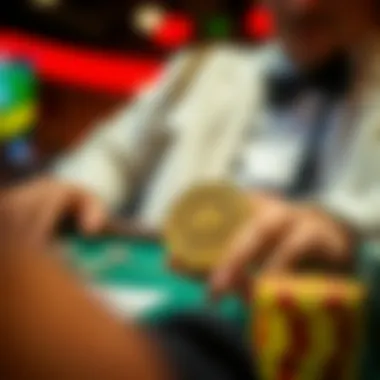
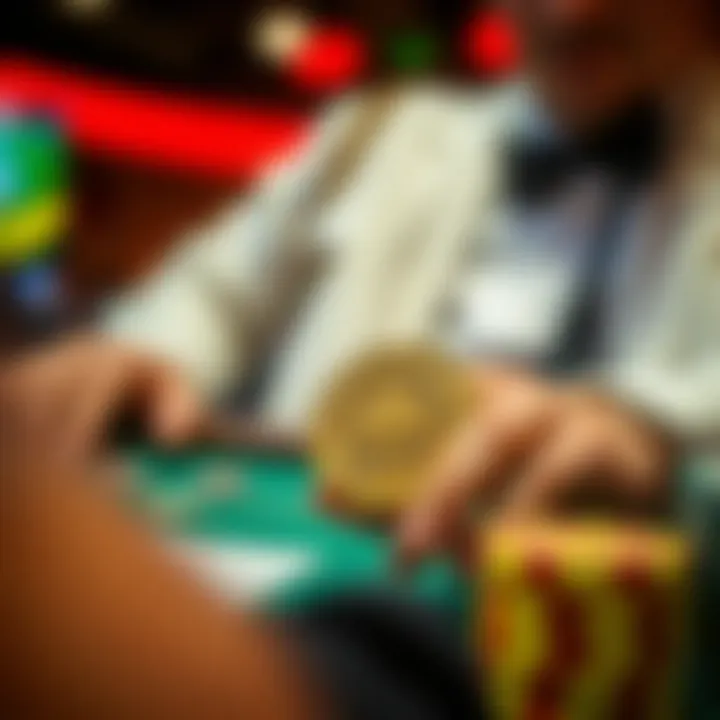
The intersection between lucky charms and player behavior represents a fascinating microcosm of human psychology intertwined with cultural beliefs. Gamblers, whether they spin the roulette or shuffle cards, often turn to charms imbued with personal significance. Their choices are not merely whimsical; they stem from deep-rooted beliefs that luck can be cultivated. In this section, we will explore how these charms influence key elements such as risk-taking behaviors and, subsequently, game outcomes.
Impact on Risk-Taking
The act of gambling itself is a gamble, but when combined with personal lucky charms, it can morph into a greater leap of faith. Having a talisman, like a lucky coin or a specific shirt, often instills a sense of empowerment in players. Many find themselves making bolder choices, pushing boundaries they might otherwise avoid, like betting larger sums or playing longer than intended. This surge in confidence can be traced to psychological theories around cognitive dissonance; players rationalize that their charm enhances luck, thus justifying their elevated risk aversion.
- Enhanced Confidence: Wearing a beloved charm can act like an armor against self-doubt. The very presence of a supposedly lucky object can quiet the mind's nagging thoughts, pushing players to embrace opportunities that, without it, they may avoid.
- Altered Decision-Making: When players are armed with their lucky talismans, the consequences of a potential loss may feel less daunting. The belief in luck alters their perception and can skew the scale of risk versus reward. In a heated poker game, for instance, a player clutching a rabbit's foot may decide to raise the stakes, convinced their charm will tip the odds in their favor.
"What one believes about luck often manifests in choices made at the table. It’s a psychological dance that players engage in, sometimes unaware of how their beliefs guide their hand."
This reliance on charms can lead to a cycle, where previous successes are attributed to their presence, thus reinforcing the behavior. Over time, this can create a pattern where players become increasingly likely to take risks, regardless of the logical pitfalls that might be looming.
Influence on Game Outcomes
Now, stepping beyond the psychological ramifications of risk-taking, let's focus on the tangible impact these charms can have on game outcomes. Believing that one has an upper hand, due to a lucky charm can influence not just outcomes but entire game sessions. Players often interpret the results of their games through the lens of their beliefs about luck. This lens may distort their understanding of reality, effectively altering their perception of what constitutes a "good" or "bad" outcome.
- Self-Fulfilling Prophecy: When a player wins while carrying or using a lucky charm, this victory reinforces the belief that such objects hold power. Subsequently, they may approach future games with an inflated sense of expectation. If a specific charm has brought success before, it becomes harder to detach from this notion, potentially skewing future gameplay.
- Community Narratives: The tales shared in gambling communities often glorify instances of lucky charms leading to great victories. This forms a narrative surrounding these items, amplifying their perceived importance across various games. Like a cherished story passed down through generations, these shared experiences create a kind of folklore linking players and their luck. Examples include famous poker players who have personal rituals, and countless anecdotes around shuffle boards being blessed for good luck.
As these players navigate their chosen games, every decision they make—and indeed every outcome—may be flavored by their beliefs surrounding luck. In this way, lucky charms not only mediate individual experiences but also shape collective behaviors in gaming environments.
By thoroughly understanding the connection between lucky charms and player behavior, we delve deeper into the nature of gambling itself—navigating the delicate balance between chance, belief, and emotional investment that defines the gambling landscape.
For further reading on the impact of superstitions in decision-making, you may check out resources on cognitive biases at Wikipedia.
Understanding these nuances reveals not just how players react but why they continue to engage with their beliefs, no matter how fantastical they may seem.
Case Studies and Anecdotal Evidence
Examining case studies and anecdotal evidence plays a crucial role in understanding the behaviors and beliefs surrounding lucky charms in gambling. These firsthand accounts provide tangible examples of how charm-related rituals manifest in various gaming environments. When we look at specific instances where innovations or personal beliefs lead to victories or losses, we glean insights that go beyond mere statistics. They reflect the intricate relationship between the psychology of the player and their faith in luck.
Anecdotes often capture the nuances of individual gambling experiences, making them relatable and engaging to readers. As we dissect cases of notable gamblers or even casual players who attribute their successes to specific lucky charms, we not only analyze personal beliefs but also popular trends forming within cultural contexts.
These stories present an introspective view of gambling; they highlight emotional investment in luck, emphasizing how personal anecdotes can shape one's gambling philosophy.
Notable Personalities and Their Charms
Consider the instance of renowned poker player Daniel Negreanu. He has frequently spoken about his lucky rail, a specific group of friends whose presence, he believes, brings him fortune at the tables. He wasn't just mouthing superstitions—his real connection to the charm was shaped by years of experiences where their support transformed his mentality in high-pressure situations. Thinking of these bonds as charms, he cultivates an environment ripe for success, showcasing that lucky charms could often be more about community and less about physical objects.
On the other hand, we find stories of infamous sports legends like Michael Jordan. What stands out about Jordan is his affinity for wearing his college shorts under his NBA uniform. This may seem like a trinket or a simple quirk, but for Jordan, it symbolized his connection to his roots and memories of triumph. This illustrates how deeply rooted such charms become over time and their profound impact on both performance and mindset.
Research Studies on Luck and Performance
Various research initiatives have dissected the correlation between luck and performance in gambling settings. Studies often focus on how belief in lucky charms can influence psychological responses to wins and losses, as well as decision-making processes. Academic explorations, such as those found in peer-reviewed journals, show that placing faith in these charms may reduce anxiety in high-stress situations. A study conducted by researchers at the University of British Columbia in 2012 investigated this phenomenon; they discovered that subjects who believed in luck tended to persevere longer and made bolder choices in gamble scenarios.
“Believing in luck can psychologically empower players, giving them the push they need”, one study concludes, emphasizing a player's mental state rather than the odds alone.
Additionally, another notable investigation published in the Journal of Gambling Studies offers insights into how rituals associated with lucky artifacts could enhance performance due to the comfort and confidence they instill in players. The findings also highlight how other social factors contribute to the efficacy of these charms—like the atmosphere in which they are employed. It raises the question of whether the charm itself holds any significance, or if the belief in it provides the real edge.
Ultimately, understanding these case studies and research findings enriches our comprehension of why lucky charms hold weight in gambling culture. They highlight that charm-related practices are more than simple idiosyncrasies; they can act as psychological tools that enhance one's confidence and perceived control in games governed by chance.
The Fine Line Between Faith and Strategy
In the world of gambling, the thin boundary between superstition and logical strategy becomes a topic of intrigue. Gamblers often oscillate between methods anchored in statistics and strategies influenced by personal beliefs. Understanding this dichotomy allows players not only to sharpen their skills but also to examine the impact of their beliefs on performance. Here, we take a closer look at important elements surrounding this balance.
When Beliefs Enhance Performance
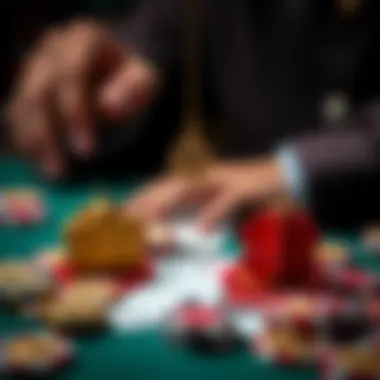
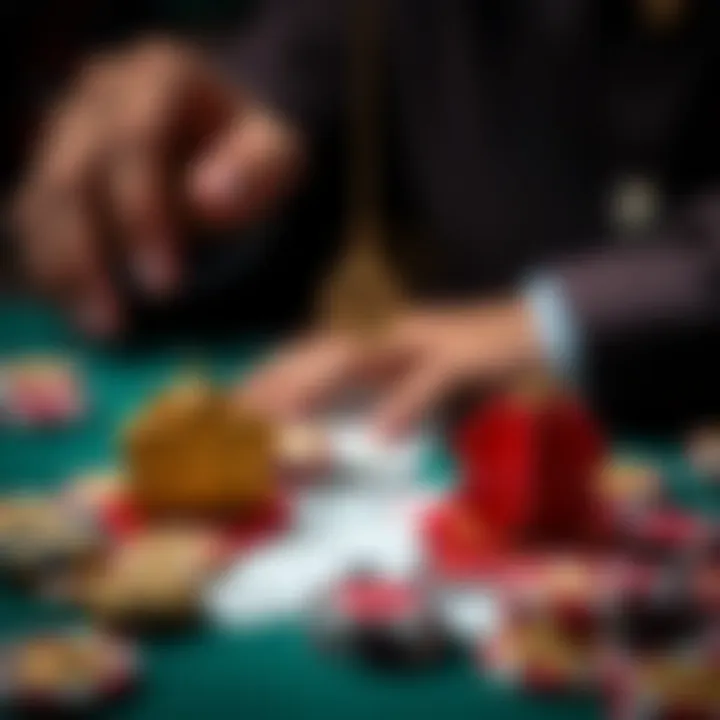
It's not uncommon for gamblers to find themselves relying on their personal rituals – be it wearing a lucky shirt or carrying a specific charm – to enhance their performance. This phenomenon often stems from the placebo effect; when players believe that something boosts their chances of winning, they may experience actual improvements, stemming from increased confidence.
For instance, a poker player might always sit in the same spot at the table, believing that it enhances their luck. That conviction can lead to a calmer mindset, which can enhance concentration. Some studies suggest this behavior links to a more predictable performance, which gives the player a sense of control over the game. In essence, the belief in luck, while possibly unfounded statistically, can result in a positive psychological advantage.
"Superstitions do not alter the laws of probability, but they can definitely shape a gambler's mindset, influencing their choices in critical moments."
Nevertheless, it is crucial to recognize that these beliefs, while they may enhance performance on occasion, do not account for the underlying randomness of games of chance. Players must remember that the outcome of the game is often dictated by odds, independent of personal rituals.
Potential Pitfalls of Reliance on Luck
While it’s tempting to lean heavily on faith in superstitions, there lies a risk in letting beliefs completely overshadow strategy. One of the more glaring dangers is the tendency to engage in confirmation bias; when a gambler wins after following a supernatural ritual, they may reinforce that behavior as an effective strategy. Conversely, when losses occur, they might attribute that to bad luck and fail to reconsider their approaches.
Some potential pitfalls include:
- Neglecting Skill Development: Gamblers who overly focus on lucky charms may ignore important game strategies or methods that genuinely enhance their chances of winning.
- Emotional Decision-Making: Reliance on luck can lead to erratic decisions during gaming sessions, swayed more by emotions than by calculated judgments.
- Financial Implications: Overconfidence boosts risk-taking. Gamblers may make larger bets under the impression of luck, leading to severe financial repercussions when luck doesn’t pan out.
To curb these pitfalls, gamblers should cultivate an awareness of their betting habits. Balancing faith with evidence-based strategies may not only improve their game but also safeguard their investment over time. Recognizing when to trust instinct while grounding decisions in reality is vital; it demands careful reflection on motivations behind why they gamble the way they do.
Alternatives to Lucky Charms
In the gambling world, the reliance on lucky charms often dances hand-in-hand with deeper beliefs and rituals. However, alternatives exist that can provide players with a more grounded approach to games of chance. Focusing on practical strategies rather than superstitions can offer significant advantages in gambling environments. This section looks at two main alternatives: skill development and understanding odds and probabilities, providing a framework for success that relies less on luck.
Skill Development and Practice
When it comes to gambling, especially games like poker or blackjack, honing one’s skills can be more impactful than relying on any charm. Skill development isn’t just about knowing the rules; it encompasses practice, strategy, and personal experience.
- Dedicated Practice: Players who consistently practice tend to perform better. This can involve dedicating time to play at home or participating in smaller stakes games. Each game played is an opportunity to refine techniques, learn new strategies, and adapt to the behavior of other players.
- Learning Resources: In today's digital age, resources are abundant. Websites like pokerstrategy.com offer insightful articles and forums where players share tips and strategies. Using these resources can elevate one's game significantly.
- Analyzing Past Games: Keeping records of past performances can highlight strengths and weaknesses. Players can reflect on winning hands, losing blunders, and unexpected game variations, leading them to make informed adjustments.
When players prioritize skill and continual improvement, they often find that their success rate increases dramatically, showcasing that reliance on charm doesn't hold a candle to mastery over the game.
Understanding Odds and Probabilities
Understanding the mechanics of gambling from a mathematical perspective is another alternative to the reliance on lucky charms. This knowledge fosters better decision-making and minimizes the unpredictability that can accompany games of chance.
- The Basics of Probabilities: Knowing the odds can help gamblers make better choices. For example, in roulette, the odds of winning can vary greatly depending on the type of bet placed. Recognizing this can provide a strategic edge and lead to more calculated risks.
- Bankroll Management: A key element of gambling success lies in effective bankroll management. By understanding how to manage funds according to the game's odds, players can prolong their engagement and minimize losses. A well-structured budget helps maintain emotional and financial control during games.
- Risk vs. Reward: Every gambling scenario involves weighing potential risks against the possible rewards. Understanding probabilities allows players to make informed bets instead of emotional ones. Instead of relying on a rabbit's foot for luck, players can calculate whether a bet truly offers favorable odds.
"Understanding the odds is like having a map in a labyrinth. You may not know every twist and turn, but it helps you navigate the maze of chance with greater confidence."
By enhancing their understanding of skill development and probabilities, gamblers can create strategies that are logically informed rather than dependent on ephemeral beliefs. This approach not only prepares them for the unpredictable nature of gambling but also fosters a sense of agency in the game's outcomes.
Finale: Personal Beliefs and Their Role in Gambling
In the intricate world of gambling, personal beliefs, particularly surrounding lucky charms, are integral to the overall experience. These beliefs do not merely serve as whimsical thoughts conjured up amid a game of chance; they often weave into the very fabric of individual players' strategies and mindsets. Understanding the significance of these beliefs can enhance one's approach to gambling, transforming mere participation into a more enriching experience.
Reflecting on Individual Practices
To delve into one’s own practices involves more than just examining which lucky items are carried to the casino or poker table. It is a process of introspection that combines tradition, experience, and sometimes, even a touch of nostalgia. For instance, a seasoned poker player may clutch a worn-out poker chip given by a close friend, not purely for its physical value but for the memories attached to it. This attachment elevates the chip beyond a simple commodity.
In acknowledging these personal rituals, gamblers tap into a well of mental resources that may help them stay focused. Studies show that engaging in positive affirmations or maintaining specific routines can cultivate a more confident mindset, which is vital for decision-making under pressure. Individuals should take the time to identify what works best for them. Ask yourself:
- What items have brought me good fortune before?
- Which rituals help me enter a more focused frame of mind?
Exploring these facets can create a sense of empowerment, enabling players to embrace the psychological balance between luck and skill in gambling.
The Ongoing Attraction of Luck in Gaming
The enchantment of luck within gambling continues to captivate players around the globe. Whether it’s throwing dice, spinning a roulette wheel, or flipping cards, there is a fundamental appeal in trusting forces beyond one’s control. This connection to luck is steeped in both primal instincts and contemporary beliefs. Many gamblers still believe that luck can be summoned through specific actions, such as wearing a favorite shirt or reciting a lucky mantra.
This attraction's roots are deeply embedded in human psychology. Luck represents hope, a beacon in the uncertainty that gambling often brings. A study published in the Journal of Gambling Studies highlights that players often associate favorable outcomes with their lucky charms, leading to a feedback loop that reinforces these beliefs. This phenomenon isn’t exclusive to gambling; it mirrors other areas of life, such as sports and academics.
Despite the nuances of gambling strategies and statistical reasoning, it’s hard to ignore that the allure of luck will forever hold players within its magnetic grasp. In this light, the consideration of luck isn’t frivolous; instead, it reflects a profound need for control in an unpredictable environment. Thus, even amidst the bold calculations of odds, the personal belief in luck — and the purpose it serves — remains as significant as ever.















